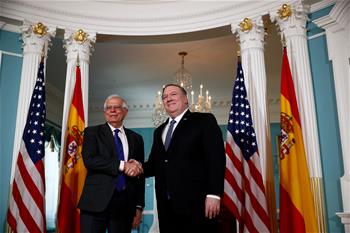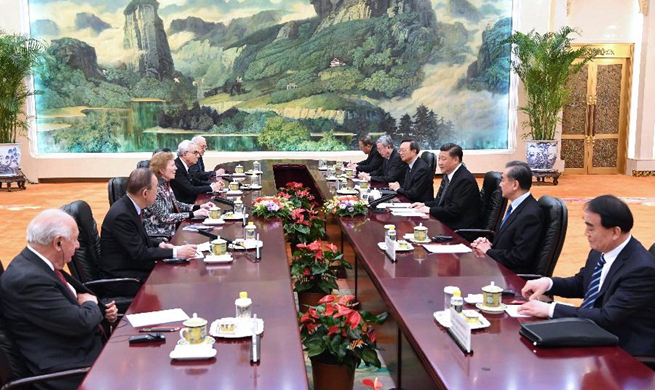WASHINGTON, April 2 (Xinhua) -- Managing Director of the International Monetary Fund (IMF) Christine Lagarde said here Tuesday that the IMF anticipates a "synchronized deceleration" of global growth in the years ahead, and that resolving trade disputes by imposing import tariffs will invite "self-inflicted wounds."
DECELERATION BUT NO RECESSION
Addressing the 13th Annual Capital Markets Summit held at the U.S. Chamber of Commerce headquarters, Lagarde said ever since the IMF in January downgraded its global growth forecasts to around 3.5 percent for 2019 and 2020, the world economy has "lost further momentum," hinting that the IMF will further cut its projections in an updated World Economic Outlook due to be released on April 9.
Lagarde said the IMF now expects 70 percent of the global economy to experience a slowdown in growth in 2019, whereas just two years ago, 75 percent of the global economy experienced "synchronized growth acceleration."
"To be clear, we do not see a recession in the near term," she added. "In fact, we expect some pickup in growth in the second half of 2019 and into 2020."
During a panel discussion following her speech, Lagarde further explained that the "synchronized deceleration and a slowing momentum" that the IMF has predicted will be "across the spectrum," affecting advanced economies, emerging market economies, as well as low-income countries.
The expected rebound in global growth later this year and into early 2020, Lagarde said, is "precarious" because it is vulnerable to downside risks associated with "country-related uncertainties."
Those uncertainties, according to Lagarde, include Britain's planned exit from the European Union, and broader uncertainties such as high debt in some sectors and some countries, tensions around trade policy, as well as a sense of unease in financial markets.
"So indeed it is a delicate moment in and of itself," Lagarde said. "And it requires a delicate mix of policies. In other words, it should be handled with care."
THREE MUTUALLY REINFORCING POLICY AREAS
In order to ensure that policy missteps are avoided and right policies are adopted, Lagarde said three areas of action "are mutually reinforcing" one another, namely domestic policies, cross-border policies, and "coordinated efforts to tackle the major global challenges that we all face."
On the domestic policy front, Lagarde said that there is not a "one-size-fits-all" approach, and that policies should be customized to meet the needs of individual countries.
"The reality is that many economies are not resilient enough," she said, adding that high public debt and low interest rates have left policy makers with limited room to act in the face of what she predicted to be an "inevitable" arrival of a next round of economic downturn.
Lagarde called on countries to make "smarter use" of fiscal policy and strike the right balance between growth, debt sustainability, and social objectives.
The smarter use of fiscal policy, she added, "involves the continual hard work of upgrading tax systems, mobilizing domestic revenue, prioritizing growth-friendly expenditure, reducing public debt where needed."
The managing director also highlighted the necessity of addressing excessive inequality, saying that fiscal policy can play a key role in that aspect by means of progressive tax measures that should be country-specific, and stronger safety nets that can help address dislocations caused by technological change and globalization.
Lagarde sounded an alarm on a current trend that is especially evident in the digital economy, where a small number of highly dynamic companies accounted for the highest price markups.
She suggested that appropriate measures -- such as reducing barriers to entry for new firms and reforming competition framework to ensure a level playing field in all sectors -- be taken to prevent the phenomenon from evolving into a "monopoly problem."
With regard to cross-border policies, Lagarde said there are a wide range of economic issues that need to be addressed, including upgrading financial regulations, improving debt transparency, tackling illicit financial flows, among others.
She said it's true that not everyone has benefited from global trade and there are distortions in the trade system, and the system needs to be reformed, but "trade barriers are not the answer."
According to Lagarde, the IMF, after analyzing the experience from 180 countries over the past six decades, found that trade integration "clearly boosts investment -- in plant, machinery, and many other high-job-creating areas."
"Conversely," she added, "trade barriers clearly damage investment and employment."
Lagarde said the finding "is of particular relevance now," as ongoing trade tensions around the world could further damage investment "at a time when investment is already weak."
The United States has blamed several of its trading partners for running trade surpluses with it and resorted to the imposition of tariffs to reduce the gaps.
"The fact is that, historically, bilateral trade balances have been driven mostly by macroeconomic factors, not bilateral tariffs," Lagarde said, adding that the most effective way to reduce a bilateral trade deficit is to steer clear of tariffs, "because tariffs on the goods of one country only divert trade flows to other countries."
"Nobody wins a trade war ... That is why we need to work together to reduce trade barriers and modernize the global trade system-so that we all win," she said.
In addition, the managing director also called for "collective action to modernize the key functions of the World Trade Organization (WTO)."
Such effort should be made to improve the WTO's negotiating process, transparency of the organization, as well as its dispute resolution mechanism, Lagarde said.
On tackling common threats faced by the international community as a whole, Lagarde singled out combating climate change and fighting against corruption.
"Having just recently become a grand-mother, I must say that the challenge of making the planet a better place for our children-and grand-children-has taken on a special resonance for me," she added.
Speaking of curbing corruption, Lagarde cited a new study by the IMF, which showed that less corruption is associated with high tax revenues, and that better governance is often linked with higher student test scores and more efficient spending on vital infrastructure.
"This highlights the potentially huge benefit of curbing corruption-and not only fiscal benefit, but also the potential benefit to society at large," she said.
Tuesday's event came about a week ahead of the IMF and World Bank's Spring Meetings scheduled for April 12-14.
















